Create your own custom continuing education curriculum
At AE21, we recognize that every adjuster’s CE needs are different at any given time. This is why we allow you to create your own curriculum by choosing exactly the number of hours you need and covering the topics that interest you most.
At a low rate of $5.50 per credit hour, you can choose to purchase one course at a time, working your way through your compliance period or purchase them all at once. Either way you choose, you will always receive the lowest possible price.
To purchase CE courses, begin by heading over to our state-of-the-art eLearning system and logging in or creating an account. By selecting Florida Public Adjuster as your state of licensure, the system will know to show you only the catalogs that are applicable to you. The short video to the left will show you just how easy it is to get started.
Scroll down to take a look at the wide variety of courses that we have to offer!
We offer a wide variety of relevant and interesting claims training topics that will not only satisfy your CE requirement, but will truly enhance your knowledge as a claims professional.
Explore our courses below.
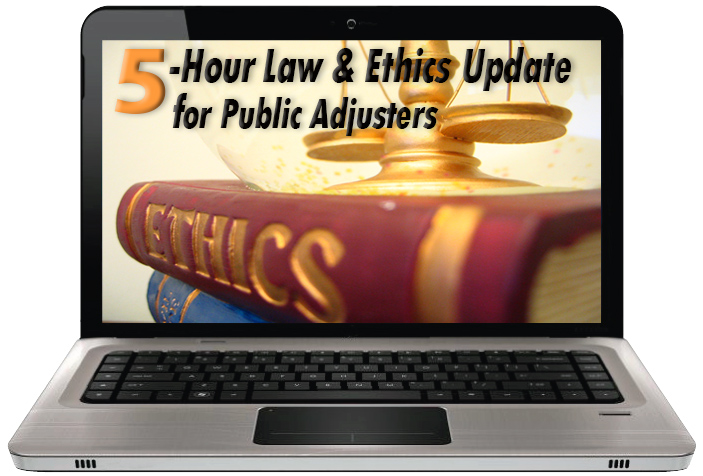
4-Hour Law & Ethics Update for Public Adjusters
We do not have a 4-Hour Law and Ethics Update for Public Adjusters available at this time.
Please check back for further updates.

Public Adjusting and the Claims Profession
This course explores the insurance claims profession from the dawn of its day through the decades of modern day claims handling, while highlighting the fundamental activities of adjusting and the higher level responsibilities of an adjuster under various state statutes.
We will discuss the role a Public Adjuster plays as part of our nation’s insurance industry, the obligations and responsibilities of a Public Adjuster and why that role is becoming increasingly important to the financial recovery of consumers after a loss occurs in today’s society. Finally, licenses are directed through the responsibilities a Public Adjuster faces under the NAIC’s Unfair Claim Settlement Practices Act as enacted by Florida and other states across the country.
3 Hour Elective CE
Course ID #69961
Introduction to Insurance Claims Adjusting for Public Adjusters
Public Adjusters are charged with the highest obligation and duty to respond to the needs of our society with utmost consideration, good faith and ethical behavior. To thoroughly understand the increasingly complex role of the Public Adjuster, one must first be familiar with terms and concepts of law, risk management, and insurance, as well as the elements of claims and the work of a carrier or independent adjuster. Only then can a Public Adjuster begin to appreciate the role a PA plays in assisting an insured policyholder with their claim(s).
In this course, Public Adjusters will first learn the history of the insurance claims business and how all of the issues and elements of the claims profession converge into a challenging and rewarding profession that serves a vital role in society.
2 Hours Elective CE
Course ID #82530


The Ethical Practices of a Public Adjuster
This course explores the higher level ethical, moral, and professional duties and responsibilities that public adjusters owe each other, their employers, the policyholders, and others as required by the Florida Adjuster Code of Ethics, FAC §69B-220.201 and the obligations of all adjusters under Florida’s Unfair Insurance Trade Practices Act, F.S. §626.954 and Civil Remedies Provision, §626.155. The course also includes a review of the consistencies of Florida’s law with the Unfair Claims Practices Acts of Texas and North Carolina and the NAIC Unfair Claims Settlement Practices Model Regulation.
3 Hour Elective CE
Course ID #83275
Strategic Negotiations for Public Adjusters
This course covers the art of claims negotiation, with particular focus on the challenges faced by Public Adjusters. Learn concepts and principles that have proven successful over the decades, including, but are not limited to, the importance of knowledge and information, the assessment of the strengths and weaknesses of one’s position, the deployment of offers and demands, and other tips best suited for claims and legal practitioners.
3 Hours Elective CE
Course ID #74023

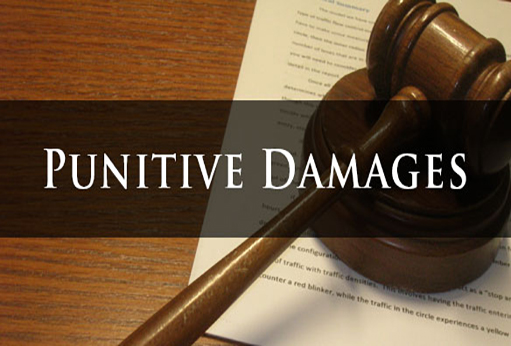
Understanding Punitive Damages
Across the United States, few things have stricken as much fear into the hearts of insurance carriers as an award of punitive, or exemplary, damages.
Consequently, over the past twenty years, much effort has been expended to implement specific tort reform initiatives that limit, if not completely do away with, this volatile legal concept of recovery and punishment.
The course provides an overview of punitive damages and their insurability on a state-by-state basis, including both substantive and procedural trends surrounding punitive damages across the nation.
3 Hour Elective CE
Course ID #61217
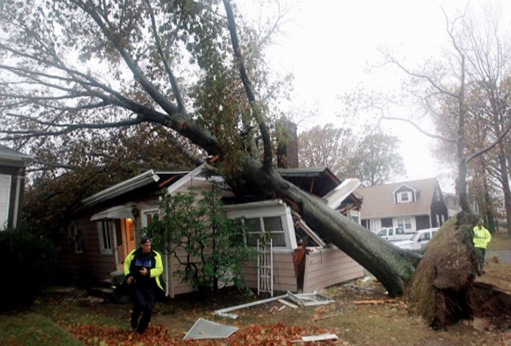
Residential Property Adjusting for Public Adjusters
Property losses continue to figure predominantly in the news, and while it is not uncommon to see the immediate effects of loss, the aftermath is less visible, including the insurance industry’s response through its adjusters as they work to adjust the claims of policyholders who have suffered financial loss.
But there is another group of professionals who speak, and act, on behalf of the insured policyholder, and their purpose is to ensure the timely and fair adjustment of first party property claims in the best interest of the insured (vs. the company). These are the industry’s Public Adjusters, and to be effective, these adjusters must possess an extremely comprehensive and detailed understanding of property coverages, a significant body of knowledge in property values, costs and methods of repair, and a working knowledge of accounting and construction methods and materials.
The objective of this course is to provide such a foundation by teaching the fundamental principles of residential property claims handling doctrine. This course is a must for emerging Public Adjusters to ensure competent service to their clients.
4 Hours Elective CE
Course ID #73955
The Public Adjuster’s Mission: Protect the Blown Away Policyholder
The special nature of insurance and the role it has played in society has been recognized by courts and legislatures for many years, and it is undisputed that an insurance policy is not obtained for commercial advantage. Instead, insurance is obtained by people and entities with the objective of protecting against unknown calamities which may or may not ever occur. Unfortunately, and all too often, after paying years of premium and expecting protection against calamity, policyholders are placed in an especially vulnerable economic and personal position when a loss occurs, and the entire purpose of insurance is then defeated when insurance companies and adjusters refuse or delay the prompt and full payment of reimbursement due under the policy.
This course explores recommended claims practices and behaviors that Public Adjusters should watch for and ensure for their clients following hurricane, windstorm and other real property losses. We will also discuss the requirements under Florida’s Civil Remedy Law, the Unfair Claims Practices Act, and Adjuster’s Code of Ethics, particularly the new ethics requirements applicable to Public Adjusters.
2 Hours Elective CE
Course ID #73954
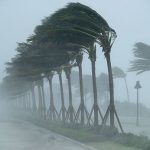
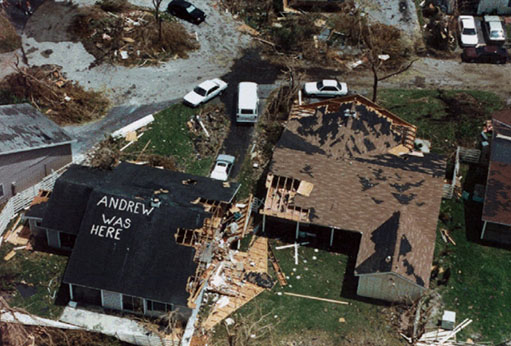
Causation Concepts for Public Adjusters
Theories of causation have played a key role in the construction of first-party insurance contracts for nearly a century. Quite often, one event can lead to another event, and in some cases, both events are meant to be covered, while in other cases, one event is intended to be covered while the other is not. Today, the inability of policy drafters to create language that is both clear (for policyholders) and unambiguous (for the courts) relative to what is covered and what is not continues that controversy and, unfortunately, the industry’s inability to satisfy its primary customers (consumer and shareholder) has led to the formation of policy language that, on its face, can be taken as completely one-sided in favor of the insurer, thus leaving the policyholder out in the cold. This is where the Public Adjuster must come in to help protect those interests and effect a comprehensive investigation and analysis of loss causation.
Using references to the San Francisco Earthquake and Fire of 1906, Hurricane Katrina (2005), and other examples, this course provides Public Adjusters with an analysis of causation and how it affects coverage under traditional 1st party homeowner’s and commercial insurance policies, including the three (3) doctrines that play a role in loss determination: Proximate Cause, Concurrent Causation, Efficient Proximate Cause, and the most recent harbinger of change in the treatment of causation: The Anti-Concurrent Cause Clause.
2 Hours Elective CE
Course ID #75523
A Public Adjuster’s Guide to Chinese Drywall Claims
This course is a must for Public Adjusters in today’s insurance environment in order to properly represent their clients in matters of first party property insurance.
The course traces the odyssey of Chinese drywall through the U.S. courts and insurance industry since its introduction into the American marketplace. Herein we will discuss the origin of the Chinese drywall problem, how it has affected businesses, industry, and consumers, the various insurance coverages triggered by this exposure, and the impact and status of litigation in the areas most affected.
2 Hours Elective CE
Course ID #74843
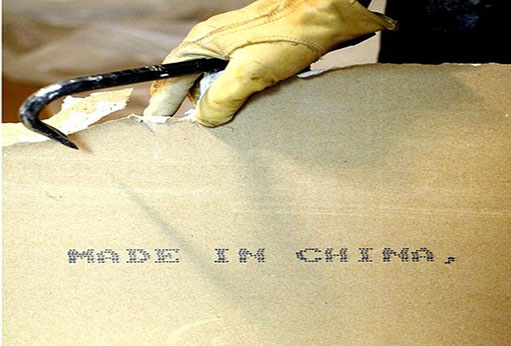
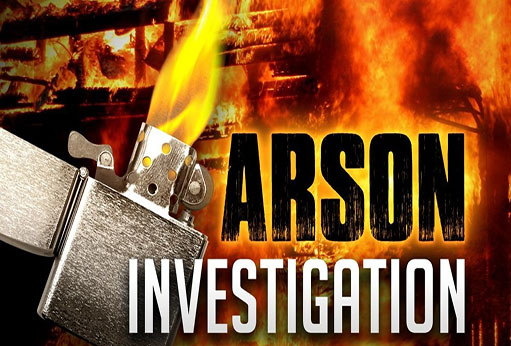
Insurance Issues Impacting Arson Investigations for Public Adjusters
First party property insurance is the exclusive domain of the Public Adjuster, and “fire” is one of the most frequent and devastating causes of property loss in that domain. Yet whenever there is a fire, there are specific insurance issues and policy requirements that impact the investigation of fire losses for possible arson. This course explores the responsibilities and issues presented in arson investigations, specifically those that affect the policyholder’s right of recovery under the policy and the ability of a Public Adjuster to successfully navigate such investigation and achieve full recovery.
In addition to the obvious areas of investigation in an arson case, the Public Adjuster must consider a number of related issues unique to both the insurance and policyholder side of the case. The Public Adjuster should consider and be prepared to respond to these issues at all times.
2 Hours Elective CE
Course ID #73841
Coordinating Civil and Criminal Arson Investigations for Public Adjusters
Arson is a crime. It is also an absolute defense to an insurance claim when the Insured has caused the fire. For both criminal and civil arson cases, a thorough investigation is the key to success. This course explores the perspectives of both the civil and criminal investigators and how their efforts can be best coordinated to achieve maximum effectiveness.
Because of the penalties that flow from a successfully prosecuted case of arson, it is critical that Public Adjusters thoroughly understand the issues involved in criminal vs. civil arson investigations, if for no other reason than to make sure they don’t inadvertently and innocently find themselves considered an accessory to this crime.
1 Hour Elective CE
Course ID #70013
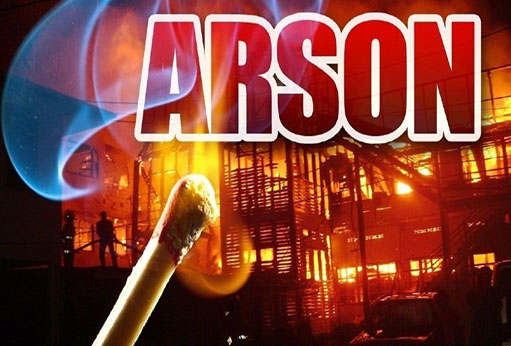
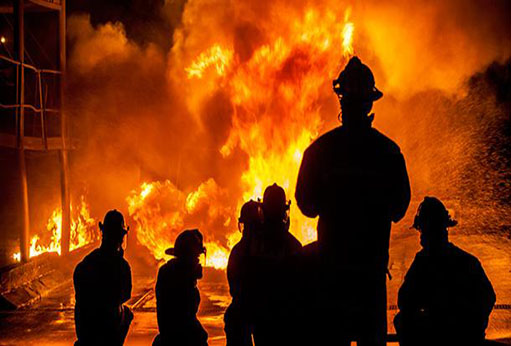
What to Expect if a Fire Claim Smells of Arson
Arson is a crime. It is also an absolute defense to an insurance claim when the Insured has caused the fire, and if a Public Adjuster becomes involved in such a claim, there could be serious consequences.
For both criminal and civil arson cases, a thorough investigation is the key confirming arson as the cause of a fire, and it begins as early as the initial application for insurance. The investigation of a criminal arson case is also subject to a set of rules which differs greatly from the rules governing a civil arson investigation. The two investigations often proceed along parallel lines, and while the lines may be closely parallel, they do not intersect because the fundamental objectives are different.
This course provides Public Adjusters with a guide to what they can expect if and when a fire claim becomes the target of an arson investigation.
*Note: This course is a combination of Insurance Issues Impacting Arson Investigations and Coordinating Civil and Criminal Arson Investigations above. This combined course would not be considered a “repeat” course of either of the above courses and may be taken in addition to either of the above courses, if desired.
3 Hours Elective CE
Course ID #84858
Introduction to Commercial Property Adjusting
Commercial property claims is, perhaps, the most preferred domain of the Public Adjuster and, on average, are far more complex than homeowner’s claims. This is due in part to the variety of coverages, nature and size of buildings, and greater value — and they typically take more time and effort. Nevertheless, when handling any claim involving commercial property insurance, the treatment of perils is basically the same as that taken in the handling of dwelling and homeowner’s claims.
This course introduces the Public Adjuster to the most common commercial coverages and adjusting concepts found in the adjustment of commercial property claims.
2 Hour Elective CE
Course ID #82547

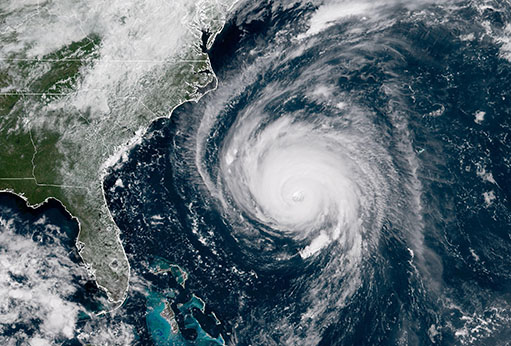
Understanding the Impact of Causation on Property Claims Adjusting
This expanded 4-credit course builds on the concepts discussed in the popular 2-credit title, Causation Concepts, by using references to and comparing the insurance industry’s response to the 1906 San Francisco Earthquake & Fire and the 2005 killer storm nearly 100 years later, Hurricane Katrina. The course is designed to provide Public Adjusters with an analysis of the doctrines of causation and how they each impact, and work to expand, coverage under traditional homeowner’s and commercial insurance policies.
We will cover the three legal doctrines of causation that affect losses involving more than one peril: Proximate Cause, Concurrent Causation, and Efficient Proximate Cause. The course will also reveal the insurance industry’s latest and most effective attempt to put a stop to these expansive interpretations of coverage: The Anti-Concurrent Causation Clause, and how and when it may be possible to successfully thwart attempts to disclaim coverage using this exclusion.
We hope you will take away additional understanding and appreciation for these complex issues, and that they help you on future challenging assignments.
4 Hours Elective CE
Course ID #85029
An Update on Chinese Drywall Litigation for Public Adjusters
In this litigation update, we take you from the origin of Chinese drywall problem, through a discussion of the various insurance coverages impacted by the problem, to the most recent decisions handed down by state and federal courts. This course is an expansion of ” A Public Adjuster’s Guide to Chinese Drywall Claims” (note that this course will not be considered a duplicate of the aforementioned course and may be taken within the same compliance period).
3 Hours Elective CE
Course ID #74843
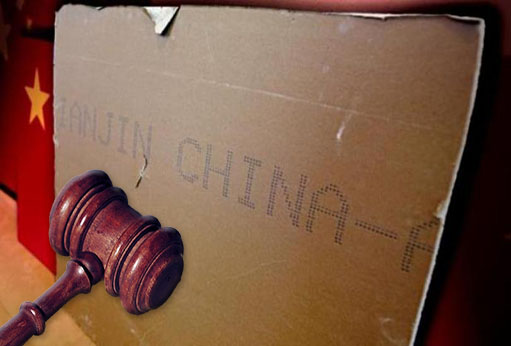

Business Auto Claims Handling for Public Adjusters
This course is designed to provide Public Adjusters with a general understanding of the coverage provided under the Business Auto Coverage and provide instruction and guidance to those who are unfamiliar with business auto claims.
This course is also designed to provide insight and direction on the day-to-day claim handling issues related to coverage interpretation and to address the most common coverage issues found when handling Business Auto claims for insured policyholders.
2 Hours Elective CE
Course ID #82571
Garage Coverage Claims and the Public Adjuster
Besides residential and commercial real property claims, Florida’s Public Adjuster license requires expertise in, and allows Public Adjusters to handle, 1st party personal and commercial auto claims.
A Garage Policy is one of the most common policies found in the commercial auto arena. This policy affords blanket coverage for operations necessary or incidental to auto-related businesses without requiring multiple insuring agreements. It also combines the features of various lines of coverage into one insuring agreement and provides physical damage coverage for garage autos as well as a 1st party-type of coverage for damage to customer’s autos while in the insured’s care, custody or control.
In this course, Public Adjusters will learn how to handle Garage claims by addressing the unique coverages provided under the Garage Coverage Form and the claim exposures faced by those in the automobile business.
3 Hours Elective CE
Course ID #82548


Public Adjusting and Garagekeepers Claims
While not many Public Adjusters handle 1st party automobile (personal AND commercial), some do; and it can a very important claim to a commercial client. You see, when a customer leaves an automobile in the care of an automobile dealer or other related auto business, there’s a tremendous risk of loss if the vehicle is damaged while the business is attending, servicing, repairing, parking or storing the auto in a garage operation. Yet getting payment from the business’s insurer can be difficult because any “legal liability” for such damage would be excluded under the liability section of most of their policies (i.e., Business Auto, Commercial General Liability and Garage Policies) by virtue of the care, custody, or control exclusion. It’s “Garagekeepers Coverage” that provides protection for damage or loss to a customers’ auto left in the insured’s care.
In this course we provide Public Adjusters with an understanding of this type of coverage, with insight on the typical claims they might encounter.
2 Hours Elective CE
Course ID #82536
